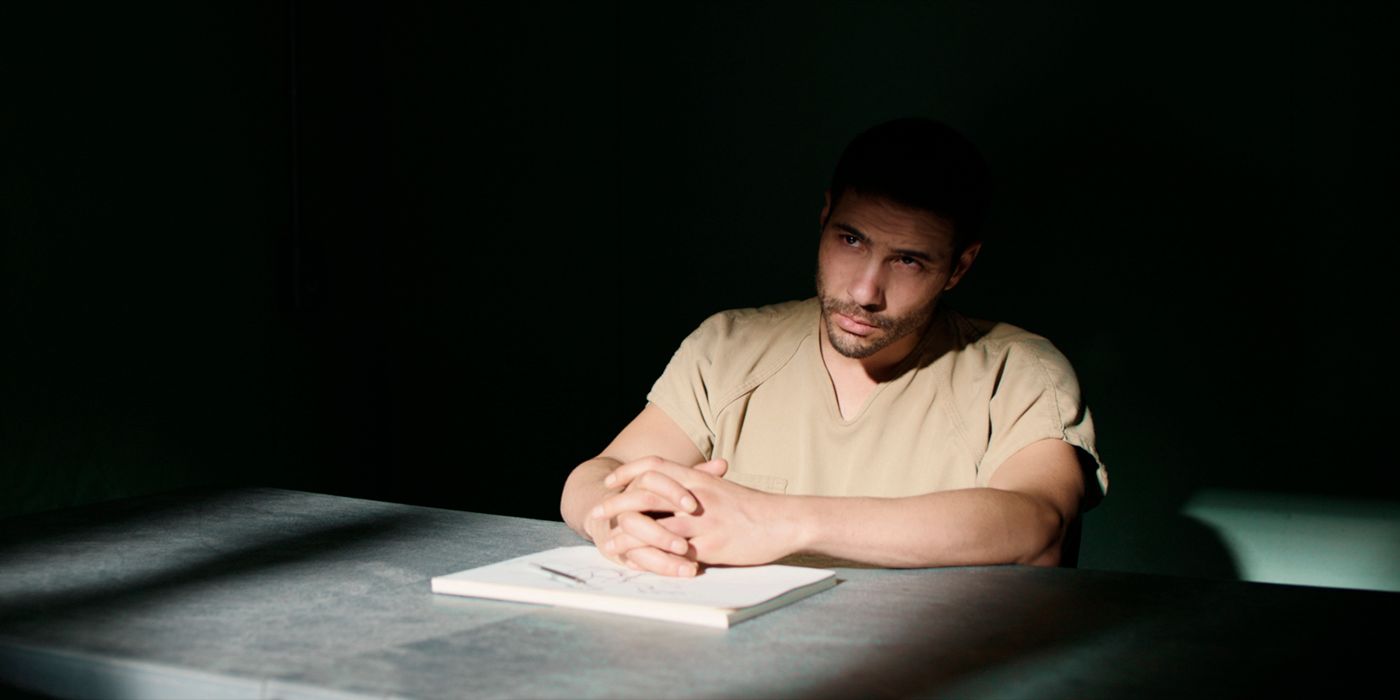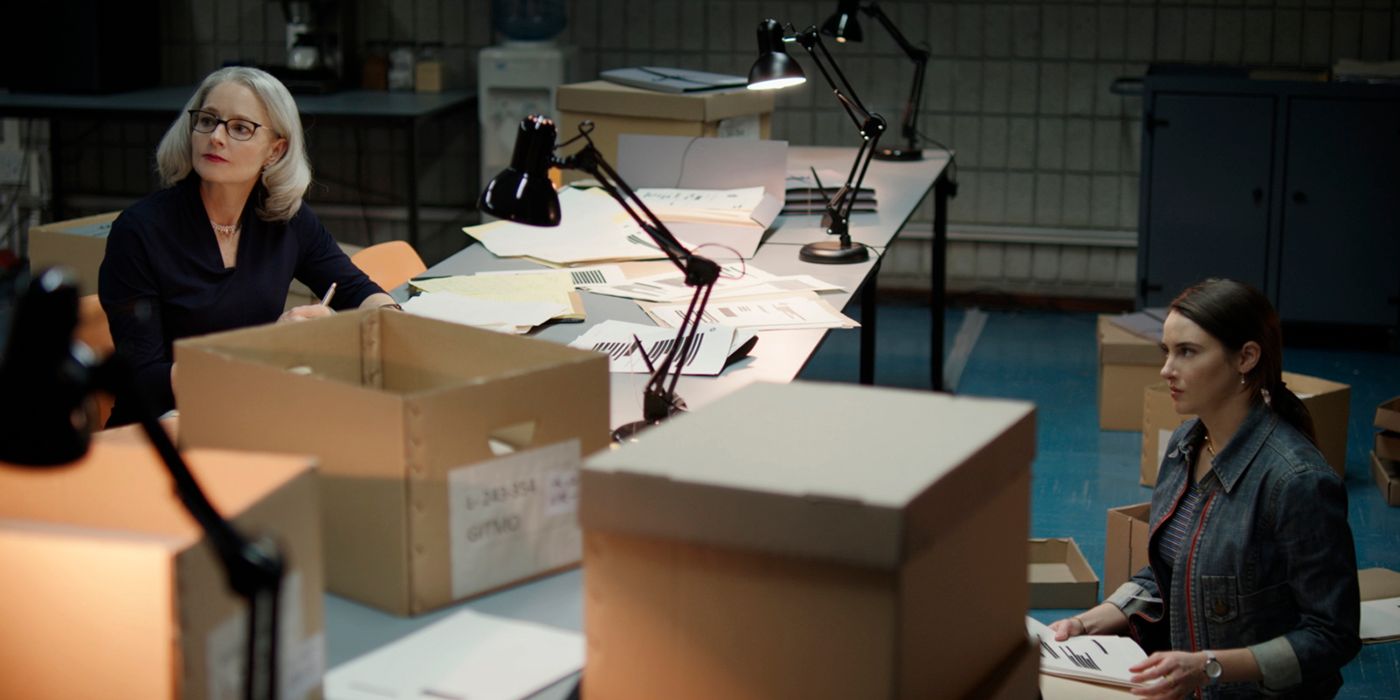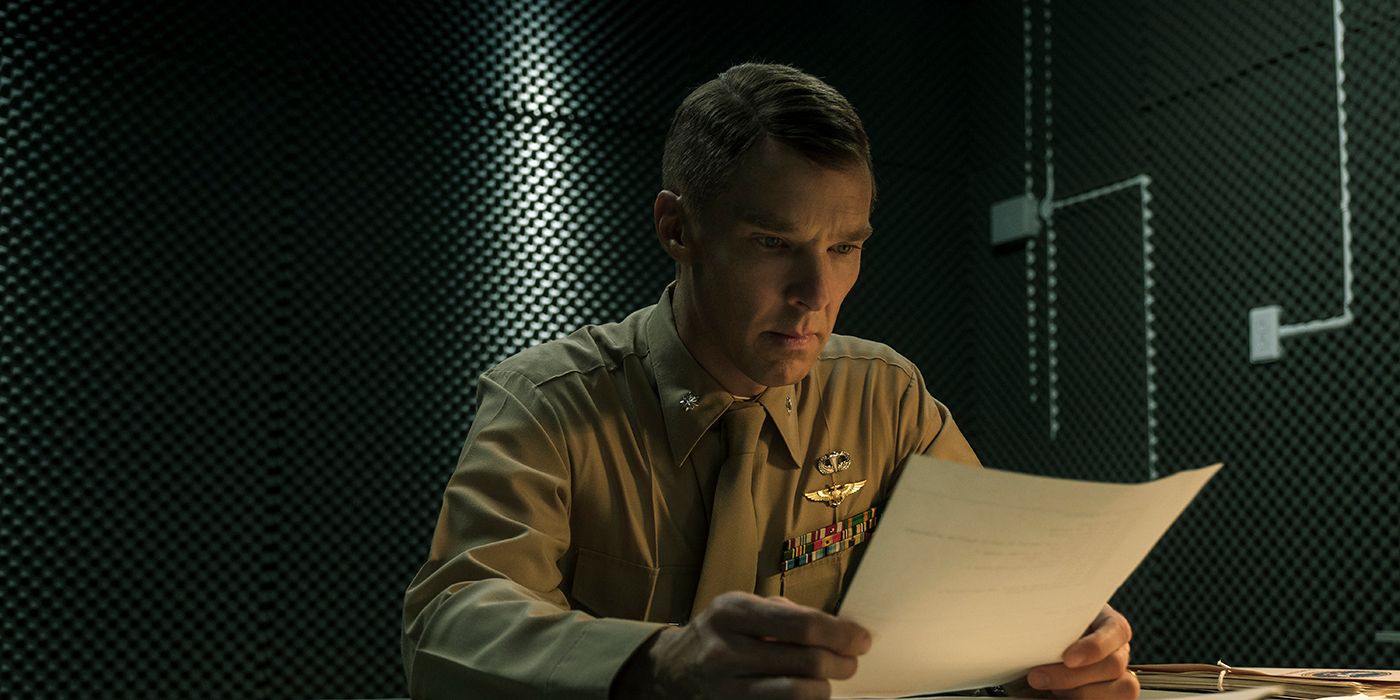The Mauritanian, based on the New York Times best-selling memoir Guantánamo Diary by Mohamedou Ould Slahi, is the tale of one man's perseverance in the face of injustice and the support system that helped him through. It arrives in theaters on February 12, through a distribution deal with STXfilms.
In addition to Tahar Rahim's (A Prophet) powerhouse performance as the wrongly-accused Mohamedou, who was tortured in Guantanamo Bay for years with no evidence against him, the film boasts a star-studded cast ready to bring its unbelievable true tale to life. Jodie Foster and Shailene Woodley portray the lawyers working on his case, while Benedict Cumberbatch plays a staunch military official who eventually realizes what's going on under his nose.
Director Kevin Macdonald spoke with Screen Rant about the conversations that led to his participation in The Mauritanian, the different acting approaches from his stars, and the active involvement from the real-life subjects of the film.
It's very easy to lose yourself in The Mauritanian and forget it's a true story, unless the aftermath is spelled out at the end. What spoke to you about Mohamedou's story?
Kevin Macdonald: Hopefully at the end, you feel like there's a redemption and kind of a happy ending. And that's the thing that made me want to tell the story; he is, in a way, an incredibly resilient survivor. He has a smile on his face, and he has managed to forgive and move on in a way that I think most people could not.
I thought that both you as the director and Tahar Rahim as the actor captured that optimism in the midst of horrible circumstances. Did you have a shorthand on set from having worked with him before?
Kevin Macdonald: Yeah, I've been friendly with Tahar for a dozen years, almost. We work together on a film in very different circumstances 12 years ago, where he didn't speak any English. I had just seen his brilliant film A Prophet, which was the film that brought him to public attention, and I thought I wanted to have that guy in my movie.
I was making a Roman epic with Channing Tatum, [The Eagle], and we shot it in Scotland. I needed someone to play a Gaelic Prince who shaved head and wears furs, and who is very violent. He doesn't speak any English; he speaks Gaelic, which is the ancient language of Scotland. Tahar was like, "Yeah, I can do those lines. I'll just learn them phonetically, and it's like an Arabic accent."
We knew each other well because of that and, over the years, I saw him learn English better and better. When I spoke to Mohamedou, I realized what a wonderful person he was and instantly thought, "This has to be Tahar." In a way, the casting of that central part - the hardest part to cast - was done in 30 seconds.
Even then, it's a demanding role for any actor to do, and I didn't know how easy that was going to be for him. He worked so hard at it and dedicated himself to it, because it was so important to him as an Arab Muslim man. Here's a rare opportunity - maybe a unique opportunity in American film - to portray a sympathetic, positive Muslim character at the heart of a movie. He knew that was a huge weight on him, and he was so respectful of Mohamedou that he wanted to tell his story as well as he could.
He gave everything to it, and he suffered for it. He wore real chains, his legs were bleeding, and he insisted on not eating for three weeks. He would just eat one egg white day, so I was genuinely very worried. I called the doctor a couple of times because I was so concerned about him, but he just had this fire in him. At the same time, the thing with Tahar is that he's the loveliest guy. He'd go from this very intense stuff, and then he'd be out chatting with the set runners and the caterers, smoking his endless cigarettes and being very French, drinking a lot of espresso. He could sgo in and out of it in a way that was remarkable to me.
And the thing is, he is very like the real Mohamedou, in that he has this positivity and sweetness to him. We would talk about how we want to feel suspicious of him to begin with, and maybe we always want to feel he's a little ambiguous, but we've got to be charmed by him and progressively more charmed. We would we would turn it up and down on the dials and say, "Let's try one like this," and he would do one [take] where he'd be quite aggressive. And then we'd do one that was super sweet, and then we'd play around. To me as a director, it was a unique experience being able to work with an actor who could calibrate things so much. And we would find the right tone over a few different takes.
It was so interesting watching Jodie and Shailene, who are very American in their approach and come incredibly prepared with, "This is my understanding of what these lines are, and this is how I'm going to do it." They would sit and watch Tahar and be like, "Wow, this is like having your own front seat to a one-man play." He's so fascinating to watch, and so much of what he's doing comes out of spontaneity and comes out of improvisation.
There's one moment in particular, towards the end of the movie, where he gives this speech to the court. It actually was the very first scene he did, because Jodie was ill, and we had to find something that he could do on his own. He did it so beautifully that, in that moment, I knew this was going to be spectacular. At the end of it, he turns to the guard who he's befriended, Steve, and he goes, "Did they hear me?" in this very beautiful way that was so vulnerable. And that was totally improvised, but that's just one little one little example of the life he was bringing to it.
I loved how as the film progresses, Nancy starts to see him as more of a person and less of a case, which is also when the movie unveils just how innocent he is. What was it like charting that progression in conjunction with the writers and with Jodie?
Kevin Macdonald: That was one of the hardest things to get right. It's a very simple arc that she has, but when Jodie read the script originally - first of all, I sent it to her there's no way she will do this. Amazingly, three days later, she writes back to me saying, "I really like the title of this. That's what got me hooked. Then I read the script, and I think this is really interesting. Let's talk about it. I've got some ideas."
We met a couple of times, we discussed the script, and we worked with the writers [Rory Haines and Sohrab Noshirvani]. But it was always Jodie who was saying, "Give me less, give me less." She was taking out lines, taking out scenes, taking out the more personal stuff. She was like, "This isn't about me. This is about Mohamedou. I don't need all this backstory, because people are gonna know who I am within the first two scenes." It's fascinating, because with actors, it's mostly like, "Could I do a bit more here? Can you give me an emotional moment?" And with her, it was always, "Take it out."
Then we get to this moment, which is my favorite scene in the movie, where she realizes what Mohamedou has been through and goes to visit him for a final time in his cell. She kind of apologizes, and she's up to that moment been so hard and tough, but you can sense that there's somebody kind of broken inside there. But she's got such armoe, which is what Jodie does so well. "I'm tough, don't come too close," but you can feel that there's somebody very vulnerable inside there, who's damaged in whatever way. If you think of Clarice Starling, that's the thing that made me think she's the perfect person to do this. When you get to that moment, and the dam breaks, Nancy becomes a human being.
Up to that point, she's seen Mohamedou as another case; a fascinating case, but still, "I don't get too close to my clients because they're always guilty." But that doesn't matter to her, because she's just doing the job of representing them constitutionally. But she finally sees him as a human being, and that is what happened with the real Nancy. From that moment on, they became so close and it's incredibly touching. The last seven years he was in prison, she was going there every month; her and Teri would swap and pay out of their own pockets, and they would fly down there just to keep him company. That was when they became super close.
That scene, I particularly loved the moment where she puts her hand out to offer this small gesture of human contact, which says volumes. Jodie calibrated that so well, saying, "Give me just a tiny amount," and then then that's the moment it builds. There's a subtlety to that which shows what a great actress she was.
I also loved how the credits sequence was filled with glimpses of them in real life, where you see the heartwarming bond between them.
Kevin Macdonald: Yeah. I realize now that I should have put a caption on that material, but it was so busy at the end. But that material is six or seven days after he was released from Guantanamo. Them on the beach together, when he gives that necklace to them both. And then the scene with the books, when he's been funny about how they've censored his book.
He'd just gotten out seven days before, and Nancy and Teri were waiting. The US government kept it secret when he was being freed, so it was only when he got there that they found out. He phoned them, they jumped on a plane and spent a week with him. Then the last little bit of him singing the Bob Dylan song from The Big Lebowski, which is his favorite movie, was thematically so perfect. That was me was just filming him for my research, when he's like, "I have to play my favorite song, ["The Man In Me"]."
You had said you were a little cautious about jumping on board with the film until you spoke with Mohamedou. How did he change your mind?
Kevin Macdonald: I read the book, and I thought, "This is a fascinating document from inside Guantanamo." But I couldn't see where the movie was, and I couldn't see the way in for a more mainstream audience. I didn't want to make a movie only for the people who already know about this stuff. It's that terrible problem with liberal issue-based films, seen only by liberal people who are interested in those issues. I wanted to make a movie that would have a wider reach than that, and obviously having an amazing cast helps with that.
But the key for me was when I spoke to Mohamedou. I was a bit intimidated, because here's a guy who spent 14 years in prison, who has been tortured and been accused of being one of the organizers of 9/11. You're like, "What's he going to be like? Really messed up, very angry, and anti-Western?" And instead, up pops this smiling face. This guy who's laughing, telling me he saw my movies when he was in Guantanamo, singing some country Western songs that he learned from a guard. Then he's telling me about what happened to him and this incredible injustice, and I got so angry just hearing what he was saying.
I'm asking, "Are you suing the American government?" This was only about a year after he got out. "Are you seeking compensation for the injustice?" And he laughed, "No. Why would I do that? I'm just going to eat up the rest of my life in anger. And I want to move on with my life." That was when I thought I had to make a film about him. That was that was the motivation, I think.
It's fascinating to me that Benedict Cumberbatch was originally only producing the film before jumping into the role of Stu Couch. What was your collaboration like with him, and how did he juggle those two hats?
Kevin Macdonald: When the book was originally published, it was a bit of a cause celebre. In 2016, Mohamedou was still in prison and a British publisher originally published it. They got some celebrities to read extracts from it to help publicize it. Benedict, who's very engaged in human rights issues, was one of the people who read it and thought this is really interesting. He'd just started a production company and bought the film rights. It was he who sent the book to me.
Then as we were developing the script, he would read it every now and again. It was a very complex story that was very hard to get right, and he would offer occasionally some notes on the script. Just before we were about to send off the script - we'd cast Jodie, we'd cast Tahar, we'd cast Shailene - we still needed to see who is going to be Couch. Benedict said, "Don't send the script off to that person. I want to do this! This is a great part."
He's very British, so he hadn't thought, "I'll play this ex-marine character." Couch is a character with a great dilemma and a great turn; he's a company, man, he's a great patriot, he's fully paid up member of the Republican Party. He's a military gu, and he also has this personal grudge, because his friend was a pilot in 9/11 who died in one of the planes that hit the Twin Towers. Weirdly, the guy who killed him was meant to be somebody Mohamedou recruited. He's got bloodlust, basically.
But then he slowly begins to understand what is happening at Guantanamo, and why the documentation is a little bit funny. He figures out it's because this information was all obtained using torture, and he does an incredibly brave thing when he stands up and says no. "I'm not going to do this. It's against the Constitution. It's against my principles as a Christian. I'm not doing it." So few people did that, even though in any kind of political situation where the rule of law is being bent and twisted, it only takes a few people with real integrity to stand up and say no. But it's very hard for people inside the system to stand up, like Mitch McConnell.
That was what was so important to me. I don't want make a movie, which is again saying, "Bush, Cheney. They were evil!" This is a movie where the Republican Christian military guy has the decency, the dignity, and the integrity. That made the whole story so perfect to me, because you have these three characters who all affected by the same events, and it changes who they are so much. That's why all three of them were really happy for the film to be made, and really incredibly supportive in terms of research. They've been fantastic.
Let me tell you, I've made a lot of films inspired by or based on real people, and that doesn't usually happen.
I can imagine. I was surprised even reading about how involved they were, but it's great that they're happy with the results.
Kevin Macdonald: It's really great. I wanted to make a balanced film, which was fair to everyone. In this time of such great division, to see a story where you see the decency in everyone pretty is a bit more life-affirming than what else is going on out there.
The Mauritanian arrives in theaters February 12, 2021,



